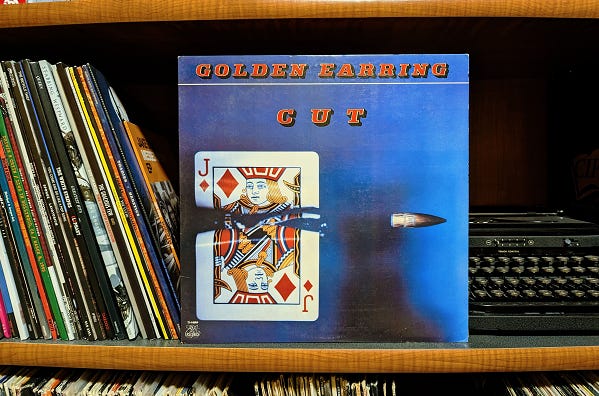Greeley Doesn't Stink... You Stink!
A reputation is hard to change.
Before I get started this week, I wanted to wish you all a Merry Christmas! I hope you have a safe and joyous holiday season.
A little over 30 years ago, I once offhandedly mentioned to my parents that I normally don’t eat breakfast. That comment has remained a point of contention with them ever since.
To be fair, “contention” may be too strong of a word these days, but it certainly applied back then (and for the next several years that followed). My mother would regularly bring up how concerned she was that I was skipping the “most important meal of the day,” and she’d even send me articles in the mail (snail mail, not email) that she clipped out of newspapers and magazines to back up the age-old mantra. It was as if my approach to breakfast was part of some principled position that warranted a continuous, philosophical debate.
While the topic still rears its head in the year 2022, it’s not as accusatory or lecture-sounding as it once was. These days, it’s presented more as a conversation item, typically along the lines of: “John, you must be starving right now... since you don't eat breakfast and all.”
I pretty much shrug off such comments (as I have for years), but what does still irritate me about them is that the premise isn’t even true, and it hasn’t been for a very long time. I eat breakfast.
Yes, back in college in the 1990s, when I had early classes, wasn’t particularly hungry in the mornings, and didn’t want to wait in line at a dining hall, I’d skip breakfast and later, when I was hungry, eat an early lunch.
It was simply a matter of personal convenience, not a strict dietary doctrine, and certainly not the lifelong commitment my parents continue to perceive it as (despite my efforts over the years to set the record straight). To them, I’m an eternally-committed breakfast-atheist. It’s part of my identity. Heck, my father even thinks I’m anti-breakfast-food (I have no idea where that came from).
Now, the point of this week’s newsletter isn’t to vent about family disputes. It’s to vent about regional ones. The family stuff was just a lead-in, the relevance of which I think will become apparent by the time you’re finished reading this piece.
You see, during that same early-to-mid-90s era, when I was attending college at the University of Northern Colorado in Greeley (where I still live), the city stunk. That’s not a critique of how the city was governed, its economy, its residents, its services, or anything of that nature. It literally stunk… as in, it smelled.
In fact, that’s what Greeley has long been known for throughout the rest of the state: smelling bad.
We were (and kind of still are) in an agricultural area, and throughout the 80s and 90s, the surrounding feedlots and local meat-packing plant regularly left a putrid stench in the air that lingered through the entire city. Think lots of manure and blood-burning. It wasn’t pleasant.
I experienced it firsthand for several years, and it was something I never quite got used to. To be clear, I grew to tolerate the smell (humans adapt), but it wasn’t something I was ever oblivious to. It remained quite detectable (to me and everyone else), especially when going outside after being inside for a while.
It wasn’t an issue every day, but it was a frequent occurrence. And while some days were worse than others (often dependent on which direction the wind was blowing), the stench, in a big way, defined Greeley. It was part of the city’s very identity, and residents here made the same jokes as the rest of the state about our foulness.
But then, over two decades ago, things started to change. The feedlots were all moved, by law, out of the city; the biggest ones now sit several miles east of us. A few years later, in compliance with new regulations, the meat-packing plant went through major renovations, and cleaned up its stinky act.
An “odor hotline” Greeley set up in the late 90s went from 650 calls in its first year to just single digits over each of the last ten years (while our population skyrocketed).
In other words, it no longer stinks here (at least, not any worse than anywhere else along the Front Range).
One thing that didn’t change, however, was the rest of the state’s perception of Greeley. Tons of Coloradans are adamantly convinced that we still stink. In fact, when other cities (even as far away as Denver) occasionally catch a whiff of manure in the air, “Greeley” is not only immediately evoked, but often even blamed.
There was a lot of this last week, when there was apparently a phantom stench working its way through the Mile High City.
And no matter how much effort is put into explaining to people that the stench ain’t coming from us (the city even started an ad campaign a few years back to dispel the myth), people just aren’t buying it.
A lot of this misconception lives in the realm of urban legend, but at least part of it, I think, comes from sincere confusion:
Trust me, I get the “maybe you are used to it” theory. But again, I never did get “used to it” back when it was an actual thing. And like I said, the stinky stuff was moved out of the city, or otherwise taken care of, many years ago.
This is the more significant part of the above tweet: “the turns leading up to Greeley.” This person is assuredly referring to Highway 85, a well-traveled route that runs north and south along the city’s eastern limit (where there are indeed “turns”).
If someone in Greeley is going to catch a genuine, momentary whiff of something foul, that’s where it would happen. The meat-packing plant (and any limited stench emitting from it these days) is just a few hundred feet off that road. And if there’s a strong wind blowing west from a feedlot ten or so miles away, I suppose it could compel a traveler passing by or along the eastern edge of our city to draw in a deep breath, nod their head, and say, “Yep, Greeley.”
But for those of us living here, it’s a much different story. The air’s fresh and the sky’s clear. Things are a-okay, y’all.
Sure, we’ll catch a very occasional exported odor from out east (just like other cities along the Front Range), and be reminded of our city’s past (for about 15 minutes until it leaves), but we can only laugh at the lingering misconception that because folks smelt it, Greeley dealt it.
As is the case with my family’s breakfast fallacy, it’s part of a lasting identity, reality be damned, and like it or not. A reputation is a hard thing to change.
Now, one might think (like the breakfast stuff) that the endless defamation (or perhaps defecation) of Greeley would get on my nerves, and to an extent it does; part of me wants to answer every “Greeley stinks!” charge with “YOU stink!!!”
But to tell you the truth, I’m mostly okay with it. That’s because way too many people have been moving to Greeley over the past decade (an increase of around 20% during that time). If dung-distress is preventing others from following suit, well… that’s okay with me.
I just figured it was finally time to — wait for it — clear the air.
Is your town known for something not so great? Tell me about it in an email or in the comment section below.
Random Thought
Obligatory Dog Shot
Merry Christmas!
Obligatory Dragon Shot
Merry Christmas!
Have you picked up your copy of RESTITUTION?
My new book “Restitution: A Sean Coleman Thriller” is out now! You can get it on Amazon, Apple, Barnes & Noble, Kobo, Books-A-Million, and wherever else books are sold.
Interested in a signed copy? You can order one (or five) here.
Already read and enjoyed it? I’d love if you could leave a review for the book on Amazon.
Featured Vinyl
Until a trip over to Wikipedia just now, I had no idea how much music the Dutch rock band Golden Earring produced over the years. It looks like 1982’s “Cut,” believe it or not, was their 16th out of 26 albums. It seems that their secret to longevity was a huge number of member line-ups, similar to the band, Chicago.
Anyway, this album includes their biggest hit (and a very cool tune), “Twilight Zone.” The song was inspired, interestingly enough, by the novel version of “The Bourne Identity.”
That’s all for now. Thanks for reading today’s Daly Grind.
Want to drop me a line? You can email me at johndalybooks@hotmail.com, and also follow me on Facebook, Twitter, and Instagram. If you haven’t subscribed to this newsletter yet, please click on the “Subscribe now” button below. Doing so will get these posts emailed directly to you.
Also, if you’re not caught up on my Sean Coleman Thrillers, you can pick the entire series up at a great price on Amazon. And if you’re interested in signed, personalized copies of my books, you can order them directly from my website.
Take care. And I’ll talk to you soon!












I was born in Bayonne NJ and as a child lived across the street from what was then the third largest oil refinery in the world, a large naval supply port, and the town dump. Things changed and the economic benefits of those places went away. I'm sure some days people would be willing to put up with those smells. BTW George RR Martin grew up in tne same neighborhood and it shows in Game of Thrones.
Reminds me of former dwelling place Lancaster County, Pennsylvania whose penchant for olfactory offense is positively luminous, mostly because dairy cows number just under 1,000,000 not to mention chickens, pigs and turkeys. We had a name for it...Dairy Aire.